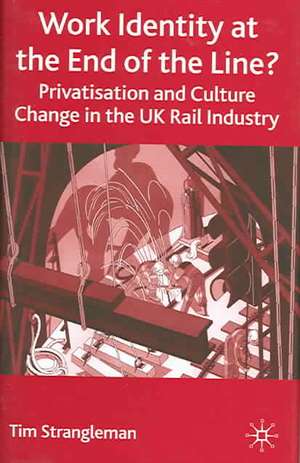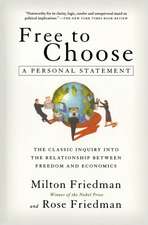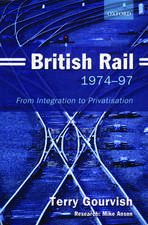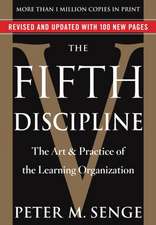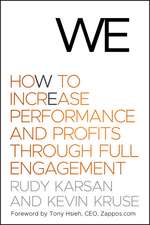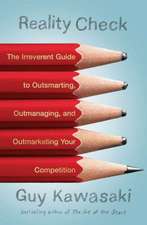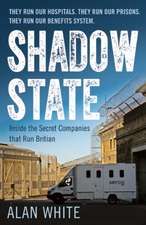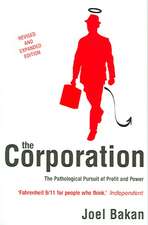Work Identity at the End of the Line?: Privatisation and Culture Change in the UK Rail Industry
Autor T. Stranglemanen Limba Engleză Hardback – 21 mai 2004
| Toate formatele și edițiile | Preț | Express |
|---|---|---|
| Paperback (1) | 635.15 lei 6-8 săpt. | |
| Palgrave Macmillan UK – 2004 | 635.15 lei 6-8 săpt. | |
| Hardback (1) | 639.73 lei 6-8 săpt. | |
| Palgrave Macmillan UK – 21 mai 2004 | 639.73 lei 6-8 săpt. |
Preț: 639.73 lei
Preț vechi: 752.63 lei
-15% Nou
Puncte Express: 960
Preț estimativ în valută:
122.41€ • 128.15$ • 101.29£
122.41€ • 128.15$ • 101.29£
Carte tipărită la comandă
Livrare economică 05-19 aprilie
Preluare comenzi: 021 569.72.76
Specificații
ISBN-13: 9781403939807
ISBN-10: 1403939802
Pagini: 208
Ilustrații: XVIII, 204 p.
Dimensiuni: 140 x 216 x 19 mm
Greutate: 0.4 kg
Ediția:2004
Editura: Palgrave Macmillan UK
Colecția Palgrave Macmillan
Locul publicării:London, United Kingdom
ISBN-10: 1403939802
Pagini: 208
Ilustrații: XVIII, 204 p.
Dimensiuni: 140 x 216 x 19 mm
Greutate: 0.4 kg
Ediția:2004
Editura: Palgrave Macmillan UK
Colecția Palgrave Macmillan
Locul publicării:London, United Kingdom
Cuprins
From Nationalisation to Privatisation Creating Railway Culture, 1830-1947 On Behalf of the People: Managing a Nationalised Railway from Attlee to Thatcher, 1948-79 A Seat at the Table? Working for the Nationalised Railway, 1948-79 Back to the Future? Railway Commercialisation and Privatisation, 1979-2001 A Brave New World: Working for a Privatised Railway, 1979-2001 Nostalgia for Nationalisation?
Recenzii
Shortlisted for the British Sociology Association's Philip Abrams Memorial Prize 2005
'This is an outstanding analysis of changing work cultures in the railway industry. In developing his arguments, Strangleman draws on the best traditions within the sociology of work and occupations, but also utilises a remarkable range of contemporary cultural and organisational theory, and above all puts the voice and feelings of the railway workers themselves centre stage. This will be a benchmark work for understanding the changing nature of work in contemporary Britain.' - Mike Savage, Professor of Sociology, University of Manchester
'Written in a lean, accessible style, Work Identity at the End of the Line? moves effortlessly from the big picture of British national politics and multinational corporate philosophy to the man in the shed whose commitment to the work and his workmates is both destructive of corporate policy and somehow gets the job done. At once a cautionary tale about the perils of privatization and a sociological paean to the stubborn resilience of both blue- and white-collar agency, the book is industrial sociology that understands that workers matter, not just for ethical or humanitarian reasons but because their social ingenuity is what makes our world work as well as it does.' - Jack Metzgar, Professor of Humanities at Roosevelt University Chicago, Author of Striking Steel
'The rail industry is a salutary lesson to those who go intothe process [of privatisation and restructuring] without sufficient recognition of the value of the past and this book is a warning to them to tread carefully before breaking up a culture simply because they do not understand it.' - Christian Wolmar is author of Broken Rails: how privatisation wrecked Britain's railways, and Down the Tube: the battle for London's Underground, both published by Aurum
'This is an outstanding analysis of changing work cultures in the railway industry. In developing his arguments, Strangleman draws on the best traditions within the sociology of work and occupations, but also utilises a remarkable range of contemporary cultural and organisational theory, and above all puts the voice and feelings of the railway workers themselves centre stage. This will be a benchmark work for understanding the changing nature of work in contemporary Britain.' - Mike Savage, Professor of Sociology, University of Manchester
'Written in a lean, accessible style, Work Identity at the End of the Line? moves effortlessly from the big picture of British national politics and multinational corporate philosophy to the man in the shed whose commitment to the work and his workmates is both destructive of corporate policy and somehow gets the job done. At once a cautionary tale about the perils of privatization and a sociological paean to the stubborn resilience of both blue- and white-collar agency, the book is industrial sociology that understands that workers matter, not just for ethical or humanitarian reasons but because their social ingenuity is what makes our world work as well as it does.' - Jack Metzgar, Professor of Humanities at Roosevelt University Chicago, Author of Striking Steel
'The rail industry is a salutary lesson to those who go intothe process [of privatisation and restructuring] without sufficient recognition of the value of the past and this book is a warning to them to tread carefully before breaking up a culture simply because they do not understand it.' - Christian Wolmar is author of Broken Rails: how privatisation wrecked Britain's railways, and Down the Tube: the battle for London's Underground, both published by Aurum
Notă biografică
TIM STRANGLEMAN is a Senior Research Fellow at the Working Lives Research Institute, London Metropolitan University. He was previously a lecturer in Sociology at the School of Sociology University of Nottingham and has held research posts at the Manchester and Durham Universities. He has published widely on the sociology of work and employment, including studies in the railway, engineering, coal mining and construction industries. He is particularly interested in culture change in organizations and workplace nostalgia.
